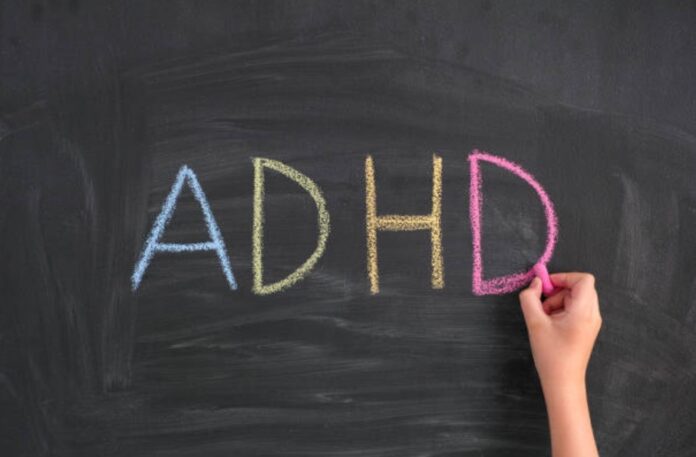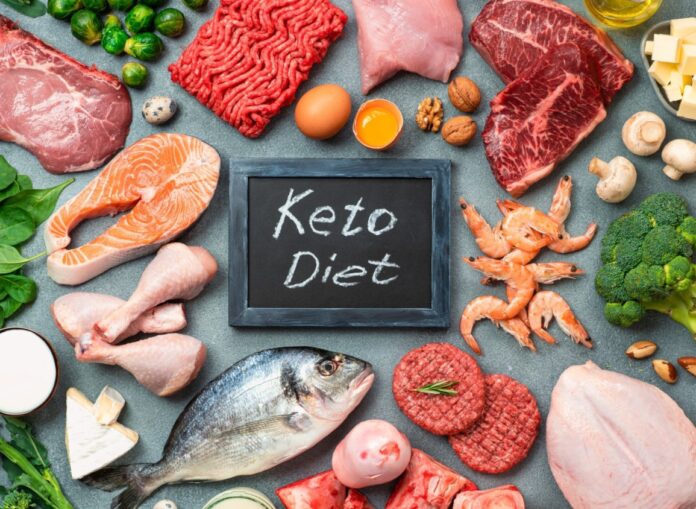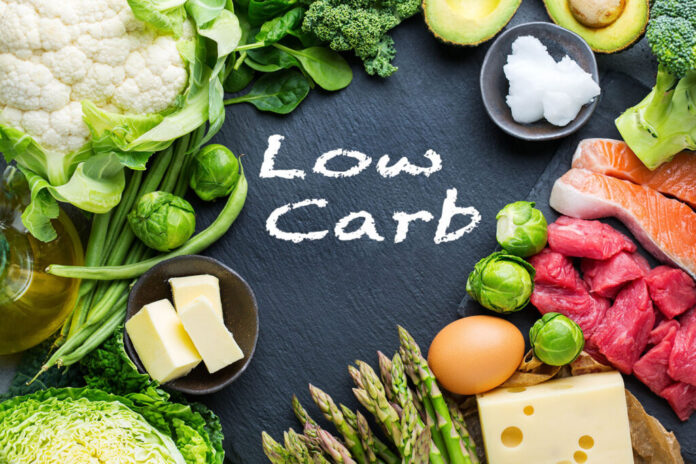Hyperactivity disorder, also known as ADHD, is a condition that affects around 3% of children in the US. Children with ADHD can have trouble staying focused, paying attention, and controlling their impulses. They may be easily distracted, and need to have things neat and organized. They may also be impulsive and interrupt others.
One of the most popular diets in the United States is the low-carb diet. This diet restricts carbohydrates, a class of natural foods that the body uses to make glucose, a simple form of energy. Glucose is necessary to fuel the brain and body, but in excess has been linked to leptin resistance, as well as higher risk of type 2 diabetes.
Low-carb diets have been proven to help with weight loss and keeping it off, which is great for many people, but what about ADHD? This is a topic that is often discussed, but many people are confused as to whether it is a good idea to cut carbs or not.
There is no real research to suggest that low-carb diets make the symptoms of ADHD worse. However, there is some evidence to suggest that a low-carb diet may be beneficial for people with ADHD, although the only way to be sure is to trial it out for yourself and see if it helps with your symptoms.

As parents, we are ready to go to any length to assist our children in growing and living their lives to the fullest. Is it possible for a kid with developmental impairments or neurological diseases to enhance their symptoms, social interaction, or behavior by converting to a ketogenic diet?
More than a dozen families replied to an ad we placed in mid-April asking parents to share their experiences with converting to a ketogenic diet for their children with ADHD, autism, and other neurological disorders.
Parents from Australia, Germany, South Africa, Canada, and the United States have contacted us. Although some of her children had only been on the diet for a few weeks and had yet to see any tangible benefits, they were optimistic and eager to continue with it.
Others shared motivational tales or videos of changes before and after. The Nusky family of Cincinnati, Ohio, was one of them, having attempted hundreds of remedies to assist their son Brandon manage his Tourette syndrome symptoms.
He has obsessive compulsive disorder and ADHD, in addition to this complicated condition that leads him to have recurring vocal and physical tics. Tourette’s syndrome, OCD, and ADHD are frequently seen together in youngsters, prompting experts to believe that they share a similar neural route.
Brandon’s tics, such as continuously moving his head from side to side, were so severe and uncontrolled until a year ago that he informed his parents on bad days that he’d best kill himself or be murdered. He was only seven years old at the time.
It’s sad when things like these happen. Chrissy Nusky, his mother, said, “We are prepared to do all we can to assist him.”
Veganism, gluten-free diets, chiropractic, homeopathy, oils, medications, and behavioral therapy have all been attempted by the family. Chrissy adds, “We spent hundreds of dollars and nothing helped.”
Then, on their pediatrician’s recommendation, they tried the ketogenic diet a year ago. Chrissy recalls the doctor posing the question to her. He said, “There is a diet that you may adhere to.” It’s a difficult situation. The majority of parents will refuse to cooperate. But if you stick with it, it will eventually pay off.
There’s nothing to lose and everything to gain by participating
Nusky’s family believed they stood to lose nothing. Her parents, Brandon, and her 10-year-old sister all converted to the ketogenic diet a year ago. They’re not having it so terrible, despite the pediatrician’s warning.
Except for berries, they don’t consume potatoes, rice, wheat, cereals, sugar, cookies, cake, cereals, porridge, juices, or fruits. Nowadays, salad and vegetables are often served with hamburger steaks (without buns) or meat and salad. Instead of spaghetti and chili, Chrissy now prepares handmade keto egg noodles with tomato sauce, which was formerly a monthly family meal.
Ground beef with taco seasoning in taco shells with keto cheese and sour cream is another favorite. I try to keep things exciting and enjoyable for the kids by allowing them to choose what we eat. It’ll work out better this way. Brandon’s elder sister enjoys cooking, so she tried out several keto bread and pastry recipes from various sources.
Chrissy makes Brandon a keto cocktail with MCT butter, heavy cream, and almond milk every morning. She sometimes mixes in protein powder, chocolate powder, or fresh fruit. It warms him up like hot cocoa on a chilly morning. She gives it to him cold, like a milkshake, on hot mornings.
The findings were astounding: these three illnesses’ symptoms improved dramatically. And the outcomes were incredible: these three illnesses’ symptoms improved dramatically. His tics are almost non-existent today, and he is calm, attentive, and doing well in school. His obsessive-compulsive condition, which compelled him to make every action and movement consistent and similar – such as applauding with both hands and wearing a watch on both wrists – had subsided.
The Nuski clan
The only thing that helps him feel better is the ketogenic diet. Her mother claims that although it isn’t a cure, it does assist with all of her main symptoms.
Brandon wants to put his knowledge to good use by assisting others

Chrissy shared the following photos with us: Brandon’s crippling tics before starting the ketogenic diet, followed by a peaceful, tic-free Brandon reading the Bible at his church after starting the diet.
For Brandon, it’s critical that I share this knowledge so that others may benefit from our experience, says Chrissy, who adds that the keto diet has been very beneficial to the whole family. Her spouse dropped 100 pounds in a year, and she not only reduced weight but also had significant improvements in her fibromyalgia and chronic tiredness. Brandon, now eight years old, and his sister have both dropped weight and are now at a healthy weight for their age and stature.
Brandon’s tortured suicide ideas were vanished, which was a huge relief to everyone. That issue is no longer an issue for us. In many respects, I believe this diet has saved my life. I get the impression that my kid has returned to me. Tics, OCD, and ADHD returned within hours after introducing low-glycemic fruit (watermelon), gluten-free pasta, and sugar-free ice cream to his diet.
Brandon has become so devoted to his diet that he now refuses to eat a piece of cake or other delicacy when his mother permits it on rare occasions. He is very aware of how he feels about it. Tics, OCD, and ADHD returned within hours after introducing low-glycemic fruit (watermelon), gluten-free pasta, and sugar-free ice cream to his diet. His tics went wild after he tasted Halo-sugar-free Top’s ice cream. We will never return to the traditional American diet. We’re going to be keto for the rest of our lives.
Other parents’ responses
Nicholas Lorente of Munich, Germany, has observed a significant improvement in his autistic son, who also suffers from epilepsy. When his six-year-old son, Angel, started experiencing recurrent seizures that could not be managed with medicine, he and his wife, Denis, placed him on a diet a year ago.
Angel was diagnosed with autism at the age of two and epilepsy at the age of five. He has the SCN2a mutation, which affects the sodium ion channels that control nerve impulses and has previously been related to autism and epilepsy.
The Lorente clan
The ketogenic diet has proved to be a successful therapy for epilepsy in many children who are unable to control their seizures with medication. Angel’s seizures became less frequent, and he was able to discontinue using both of his seizure medicines. The improvement in autistic symptoms, however, is what the Lorente family is most thrilled about. He’s more composed, attentive, and present. We believe he knows more now, according to his father, who keeps a blog on his son’s development.
The Magic Pill is a popular documentary that follows two children with epilepsy and autism as their families transition from a high-carbohydrate, processed-food diet to a low-carbohydrate, unprocessed ketogenic diet. Over the course of many months, viewers see dramatic changes in the children’s conduct and symptoms.
Peggy Holloway of Nebraska is certain that a keto diet improves her son’s ADHD symptoms whereas sugar, junk food, processed foods, and red food colors aggravate them. She informed us about his struggles in school and in life, which were sometimes so serious that we worried he wouldn’t make it through adolescence.
Thankfully, she and her son found a low-carb, high-fat diet around ten years ago, and their health has drastically improved. Her son’s good experience with dieting is now a significant incentive for him to seek a profession as a nutritionist at the age of 29.
The moral of our tale is that if a family has a kid with ADHD, they should at least attempt a low-carb diet. There’s nothing to lose, and if it’s the correct decision for the kid, the family may escape the pain Peggy and her family experienced.
Several possible routes of exposure are identified in the research
The anecdotal evidence, such as these families’ experiences, is encouraging, but what is the scientific foundation for placing children with developmental, behavioral, or neurological problems on a ketogenic diet?
Epilepsy research is vast and evolving all the time. Although it is unclear why it helps with epilepsy, it is now well known that it is an effective therapy for managing seizures in the vast majority of patients, if not all. Scientists found several processes and concepts that may be applied to other neurological disorders as they learned more about how diet affects seizures.
According to Dr. Jong Roh, a pediatric neurologist, researcher, and specialist in ketogenic treatment for neurological diseases in children, “when scientists started to grasp how the diet reduces seizures, they found certain processes and findings that may be applied to other neurological illnesses.” Dr. Roh and his research team, located in Calgary, Canada, have published more than 115 medical papers on ketogenic processes in epilepsy and other developmental disorders in children, such as autism, spanning from basic laboratory research in animal models to clinical study.
While the precise benefits of the ketogenic diet are not yet completely known, there are a variety of reasons why the ketogenic diet may enhance brain function in children with neurological problems, according to Dr. Roh in the video interview (which is also true for brain health in adults). Here are some of the ketogenic diet’s side effects:
- Ketones provide an alternate fuel source for the brain, allowing it to fulfill part of its energy requirements. Despite the fact that the brain requires some glucose, utilizing ketones to fulfill part of its requirements may reduce oxidative stress.
- By enhancing the function and interaction of cells in the nervous system and maintaining homeostasis (balance), a ketogenic diet may help protect the brain. It may, for example, relax nerve cells that are overworking or speed up nerve cells that are underworking.
- This may aid in the reduction of inflammation, which is linked to seizures and other chronic illnesses.
- It has epigenetic effects, which means it may inhibit the expression of genes linked to neurological disorders.
- It has the potential to change the gut microbiota, thereby improving gut-brain connection in epilepsy sufferers. Gut bacterial imbalances have also been related to autism, and a mouse research found that a ketogenic diet may help individuals with autism spectrum diseases. However, further study in this area is required.
Dr. Roe, whose 2018 article in Neuropharmacology presents fresh data suggesting ketones may have numerous effects, says it’s difficult to identify a single target or essential component since there are so many overlapping and possibly synergistic processes. It may be a collection of factors that, when taken collectively, have a beneficial impact.
However, a growing number of laboratory and clinical research indicate that just altering your diet may result in substantial health improvements. It’s very effective. Another 2018 article outlines what is now known about ketone bodies and the brain: They can boost energy generation, enhance growth factors in nerve cells, improve signal transmission across neural synapses, and decrease inflammation and oxidative stress in the brain.
According to the paper, these impacts seem to have an impact on a broad variety of functional brain circuits. The Charlie Foundation was founded in 1994 to assist parents of children with epilepsy who need to follow a ketogenic diet. This group currently assists parents who want to adopt a special diet for their children who suffer from a variety of neurological diseases.
They suggest five different keto diets, each with a different fat, protein, and carbohydrate ratio. These changes may assist families in tailoring their diet to their own and their children’s requirements.
Prospective research and clinical trials for the treatment of autism have been published
In recent years, encouraging case reports and early clinical studies have emerged in the medical literature, showing substantial improvements in children who were put on a ketogenic diet to treat autism.
- The example of a girl with severe autism from the age of four who experienced seizures during puberty was published in the Journal of Child Neurology in 2013. To stop the attacks, she went on a dairy-free, gluten-free ketogenic diet. She not only stopped having seizures after many years of therapy, but her behavior and IQ also improved to the point that she was no longer diagnosed as autistic. His excessive weight and long-term gastrointestinal issues were also addressed.
- 45 Egyptian youngsters diagnosed with autism spectrum disorder were randomized to one of three diets for six months in a 2017 study published in the journal Metabolic Brain Disease. A ketogenic diet was followed by 15 children, a gluten-free and casein-free (GFCF) diet by 15 children, and a normal diet was followed by 15 children as a control. The ketogenic diet and the GFCF diet both improved major characteristics of autism spectrum disorder in children, but the ketogenic diet improved social and cognitive functioning the most.
- The example of a six-year-old child with autism and ADHD from Poland whose positron emission tomography (PET) scan showed poor glucose absorption in the brain was published in the journal Metabolic Brain Disease in April 2018. He observed substantial improvements in his hyperactivity, concentration, communication skills, anxiety, fear, and emotional reactions, as well as his capacity to adjust to change, one month after converting to the ketogenic diet.
- In May 2018, a clinical study was published in the journal Physiology & Behaviour, in which the families of 46 children in Hawaii followed a ketogenic diet and MCT oil supplement. Some families refused to participate, but 15 of them followed the diet for three months and saw significant improvement in key autism symptoms. The 10 subjects who maintained the diet for six months continued to show improvement. The authors noted that the ketogenic diet plus MCT oil is a potentially useful dietary treatment for improving the underlying signs of autism, but longer-term research is needed to do so.
Dr. Julie Buckley, a Florida physician who authored a book on using food to treat children with autism, thinks that we now know enough to suggest the ketogenic diet to any kid suffering from neurological, developmental, or behavioral issues.
Any family with an autistic kid should follow a dairy-free ketogenic diet. Dr. Buckley adds, “I don’t believe there’s any reason not to try.”
Buckley is one of the authors of the above-mentioned 2013 research. Her autistic kid was placed on a dairy-free ketogenic diet, which worked wonders for her. Her daughter is now 19 years old, and despite being on the autistic spectrum, she has a high level of functioning and intelligence.
Is a ketogenic diet effective for all children with cognitive, behavioral, or neurological disorders? Buckley acknowledges that, regrettably, not everyone does. Families will only find out whether their kid reacts if they give it a shot.
Is a ketogenic diet effective for all children with cognitive, behavioral, or neurological disorders? Buckley acknowledges that, regrettably, not everyone does. Families will only find out whether their kid reacts if they give it a shot.
This information is needed by a growing number of families. The US Centers for Disease Control and Prevention reported in the final week of April 2018 that one in 59 children has been diagnosed with autism, up 15% from two years earlier and up more than 200 percent in the previous decade.
Buckley is worried that a kid with autism – or any other neurological, cognitive, or behavioral issue – following a ketogenic diet is still contentious today. No one should be forced to consume the horrible diets that we do now. I am sure that all children, whether they have autism or another condition, would be healthier if they abandon today’s poor diets – if they avoid sugar and processed foods, consume enough of good fats, and eat properly!
The idea that physicians are still divided on this subject and that further study is needed astounds me! Parents who have communicated with their children will agree. Okay, we’d want to see more proof to back that up. But, in the meanwhile, many people are wondering: What do we stand to lose, and what do we stand to gain?
It’s said to be very difficult. However, this is not the case. And because I’d go to any length to assist my children, why wouldn’t I attempt to put Brandon on a special diet? Chrissy Nusky expressed her opinion. It’s also worth telling our experience if this knowledge helps another kid.
Ann Mullens is a writer who lives in the United States
ADHD is commonly diagnosed in children and can lead to serious difficulties in life. It is a neuro-developmental disorder that affects cognitive, emotional, and social functions. The exact causes are not fully understood, but it is known that the reduced ability to pay attention in children with ADHD is a result of differences in the frontal lobes of the brain. Researchers are striving to find medications and other treatments that can help children with the disorder. One treatment option is the use of a low-carbohydrate ketogenic diet.. Read more about bananas and adhd and let us know what you think.
-Sugary foods
-Foods high in refined sugars, such as cakes, cookies, and candy
-Processed foods
-Foods containing artificial colors or flavors”}}]}
Frequently Asked Questions
Does keto make ADHD worse?
It is possible that keto can make ADHD worse, but its not a proven fact.
What diet is good for ADHD?
There is no one diet that is best for everyone. Its important to find a diet that works well with your lifestyle and personality.
What foods should be avoided with ADHD?
The following are some foods that should be avoided with ADHD: -Sugary foods -Foods high in refined sugars, such as cakes, cookies, and candy -Processed foods -Foods containing artificial colors or flavors




